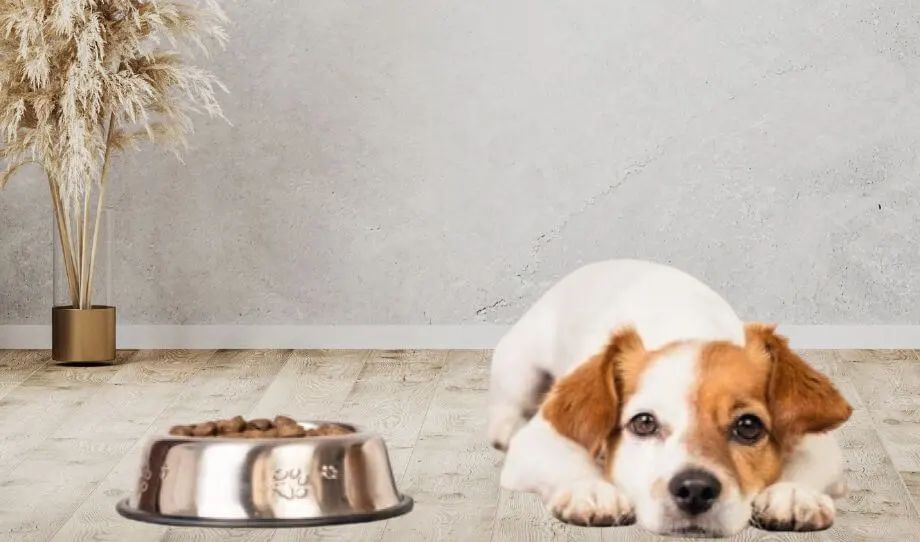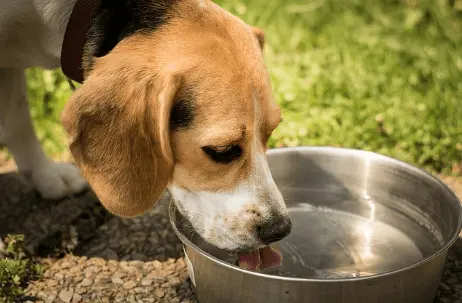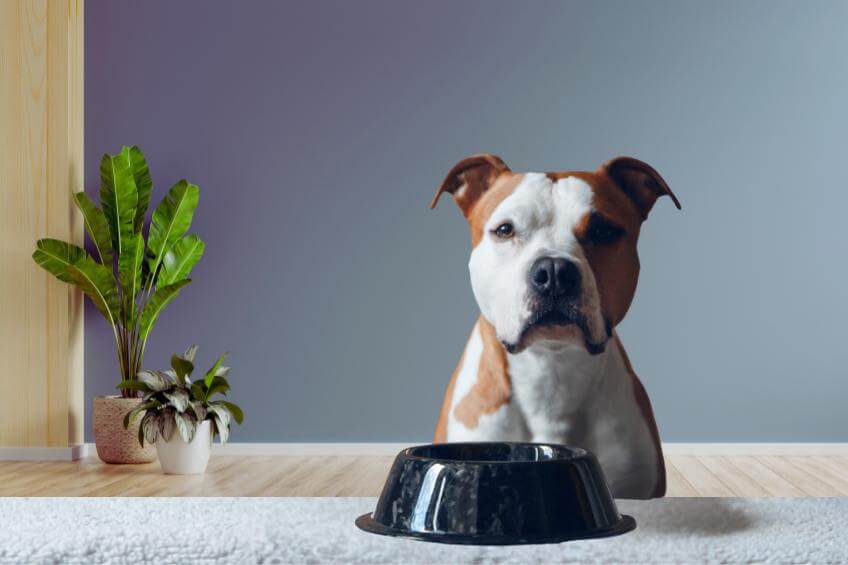Reasons Why Is Pitbull Not Eating but Drinking Water (Solutions Added)
Pitbull not eating but drinking water can happen because of stress, dental issues, constipation, or other serious illnesses such as Cushing’s disease and gallbladder, and liver issues, etc.
Let’s learn the reasons and the solutions to cheer up the appetite of your beloved dog.
Why is My Pitbull Not Eating but Drinking Water?
Pitbulls usually have a robust appetite for food of their liking. If your canine suddenly stopped eating or has lost their appetite, it can be reason for concern.
Here are some reasons behind pit bulls not eating but drinking water:
1. Dental Issues & Mouth Pain
Gum infections and toothaches cause discomfort for pit bulls when they chew food. This causes a change in eating habits.
They instinctively start to avoid solid food and only drink water or liquids. It is very common for aging dogs to start developing these issues.
You can identify dental problems from signs of bad breath which is known as Halitosis. Your dog will constantly paw their mouth and rub it against the wall or floor.
2. Nausea and Emotional Distress
Pitbulls are also very sensitive to changes in environment like moving to a new home or having a guest over. Emotional distress is a big catalyst for their loss of appetite.
A confused Pitbull, just like humans, can stress out and have anxiety issues. If your dog is anxious, it won’t have the appetite to gouge down the delicious food you serve them.
3. Cushing’s Disease and Gallbladder Issues
Cushing disease or excessive cortisol production is a serious health condition for a dog. Cortisol is a stress hormone produced in the adrenal glands.
This disease comes with diarrhea, a bloated belly, and reluctance to eat anything. It also increases a canine’s water intake and thirst. If you suspect diseases, you should immediately visit the vet.
Your Pitbull not eating could also be because of gallbladder issues. Jaundice, abdominal pain, and restlessness are common symptoms. As a result, they don’t want to eat anything at all.
4. Constipation
When Pitbulls are constipated they tend to drink more water and stay away from food. If they have infrequent or hard stools they might be in discomfort from constipation.
Inactive dogs are more prone to constipation as they don’t get enough exercise to digest whatever they eat. Let them keep drinking as much water as they want so they stay hydrated.
5. Change in Diet
Dogs build up distinct eating habits as they grow up. Believe it or not, like us, they also have a favorite food and food they will not eat even if you put it on a silver platter.
Abrupt or sudden changes in diet will lead to them refusing to eat. Dogs prefer consistency in their diet and won’t eat unless the food is to their liking.
Make sure to give them a good mixture of fiber, protein, and fat so they can get accustomed to different meals.
Side Effects of Medication on a Pitbull’s Appetite

Medication can have a serious impact on a Pitbull’s appetite. Pitbull not eating but drinking can happen from side effects of extreme medication or vaccination.
These are some common side effects to watch for:
Vomiting and Excessive Salivation
Hypersalivation is a common side effect of tramadol which is a pain medication. It has a bitter taste which dries out their mouth and produces extra saliva.
Anti-inflammatory drugs and antibiotics irritate the stomach lining of a dog and cause nausea and vomiting. Always make sure to give them probiotics if the vet orders antibiotics to relieve some of this strain.
Excessive Saliva can cause breathing problems for your pit bull. Learn more about Pitbull breathing problems here.
An Upset Stomach
Most dog medicines are administered through the mouth and absorbed by the gastrointestinal tract. Steroids, blood pressure medicines, and flea and tick medications can cause a mildly upset stomach in dogs.
Signs of an upset stomach include drooling, whining, and diarrhea. Symptoms usually resolve with the dog’s body slowly adjusting to the medication.
Change in Taste and Behavior
Restlessness and hyperactivity a common side effects of anti-anxiety medications. These also alter a dog’s sense of taste and eating habits.
Clindamycin and Amoxicillin are widely prescribed antibiotics known for their metallic and unpleasant taste. These heavily reduce their appetite for even their favorite food.
Behavioral changes lead to other problems such as excessive pawing, barking, and restlessness. You can read more about Pitbull paw problems.
Drowsiness and Lethargy
Lethargy is when your dog is always extremely unmotivated to do anything. It is sometimes associated with tiredness but a lethargic dog just has a lack of interest in day-to-day activities.
These dogs are unwilling to get out of bed and sleep all day. They are unwilling to eat or finish their meal. Even if they do eat, they have difficulty chewing or swallowing.
Pitbull Not Eating but Drinking Water: When Should I Visit the Vet?
Even if your beloved Pitbull is eating less, it isn’t a cause for concern as long as they maintain their day-to-day activity.
Most often than not your dog’s appetite will return to normal in a few days. But in extreme cases, you might need to consult a vet.
Look for these signs before talking to the vet:
- Weight Loss: Weight loss is a direct indicator of malnutrition and digestive disorders. If your Pitbull is not eating enough, it will not get the necessary nutrients its body needs. Go see a vet to check for hyperthyroidism if you notice significant weight loss in a short period.
- Lethargy: A lethargic Pitbull may be suffering from a viral or bacterial infection which decreases their energy and motivation. It can also stem from diabetes or kidney diseases. This can quickly become a cause for concern and an immediate vet appointment.
- Diarrhea: Frequent diarrhea is an indicator of parasitic infections or toxin ingestion. Diarrhea severely dehydrates your dog and makes them malnourished. Do not hesitate to let a doctor take a look.
- Prolonged Refusal to Eat: If your dog doesn’t eat at all for a prolonged period, they might become susceptible to all kinds of diseases. Take them to see the vet before it is too late.
- Vaccination: Lack of vaccination is a big reason for dogs to develop serious health issues. Parvovirus easily takes hold of unvaccinated dogs. Without proper medical care, the situation can become fatal for your little companion. If you love your dog do not skimp out on vaccines.
How to Encourage a Picky Eater to Finish Their Meal?

More often than not, the reason for a Pitbull not eating but drinking water is as silly as the dog being a picky eater.
Here are some ways to encourage a picky Pitbull to eat up:
- Stick to a regular feeding schedule. Put out their meal at the same time each day.
- Try different flavors and textures from time to time and don’t forget to give them little treats once in a while.
- You can also add toppings to make the food more appealing. Ground beef and canned dog food that does not have any seasoning are great toppers.
- Feed them smaller portions more frequently instead of two large meals a day.
- Mix wet dog food with dry kibble to add extra flavor and moisture.
You can also watch these video.
Pitbull Not Eating but Drinking Water – (FAQs)
How long can a healthy dog go without food and water?
Most healthy dogs can go up to five days without food but they need to drink plenty of water to keep themselves hydrated.
How to get a sick dog to eat?
Hand-feeding is the best way to get your sick dog to eat it. It will help comfort the little things and encourage them to eat. Feed them slowly and one piece at a time.
Is it okay to restrict my Pitbull’s water intake to make her eat?
No. If she is refusing to eat try a bland diet. Dehydration will only lead to more serious health issues.

